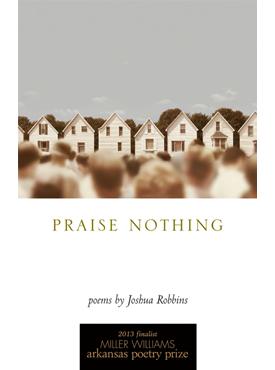Finalist: 2013 Miller Williams Poetry Prize
In Praise Nothing, Joshua Robbins writes from a suburban landscape of strip mall bars and vacant lots in which addicts and itinerant preachers, hymns and the turnpike’s whine are all made to confess, to testify to the hard truths of faith and doubt in middle-class America. In this arresting and finely crafted debut collection, readers travel a via negativa of sidewalk weeds and patched asphalt that meanders past cheap motels and laundromats, trailer parks, and corner churches to a place where a truant God aimlessly and endlessly drives the neighborhood, where birds sing their “fevered hymn / over the dusty tract house roofs” and even the “gravel-throated hallelujahs of dumpsters” profess that “no one is looking for the infinite.” Populated with figures as diverse as Janis Joplin, Ronald Reagan, the Big Bopper, and Søren Kierkegaard, these poems are wrought by reverence and skepticism. Praise Nothing navigates the religious, the political, and the sublime. In the lyric tradition of Gerard Manley Hopkins’s Terrible Sonnets and James Wright’s odes to the Midwest, Robbins’s compassionate poems sing of our broken connection to the transcendent. Robbins shows us that if there is anything left to praise, it is Nothing.
“There is nothing sentimental in this work . . . just the unflinching vision of a perceptive eye . . .. This is a strong work, one that uses sharp and fresh language to achieve compassion.”
—Walter R. Holland in Pleiades, Winter 2014
“In Praise Nothing, his first book, Joshua Robbins has written a supple poetry of moral reflection and social responsibility. With oracular rhetorical skills, dramatic narration, and the telling use of fine, sometimes minute, details garnered from observations of the everyday, he’s pitched his poems to the registers of poets like T. R. Hummer and the early James Wright. Yet Robbins’s use of dramatic situation and shards of narration remind me of American naturalism—the fiction of Theodore Dreiser and Stephen Crane. His people are ones so often ignored in general histories, and they provide him with the very bewilderments and frustrations, the meditative fractures in the seamless worlds of general economy and culture that inspire in him a sublime poetic tenderness for their existence. Robbins has achieved a well-crafted and worthy style, making himself distinctive for his deft use of traditional rhetorical structures, for the understated elegance in his strophes. Robbins has planted his flag on the serious side of the street.”
—Garrett Hongo, author of Coral Road
“The burden of these poems is Faith, once held, now endlessly longed for and endlessly eluding. This is our late American moment, the moment of asphalt and strip malls, of identical subdivisions and office parks, of convenience stores and chain-link fences, junkies and missing girls and bodies coughed up in the shadows of warehouses. ‘What consolation is there,’ Robbins asks, ‘between heaven and earth, / between here and after?’ Nothing, it would seem, since ‘surely nothing / is coming for to carry us home.’ Like Larry Levis, Joshua Robbins stares straight into the sun and doesn’t flinch, and yet, like Levis, he manages to find brief moments of beauty in terror and desolation. We are all the better for his hard truths. It’s difficult to believe this is a first book, but, remarkably, it is. What a debut!”
—Susan Wood, author of The Book of Ten
“‘I could,’ Joshua Robbins writes, ‘I could listen / to the trash can’s / tipped-over plea’ and filled with the presence and fullness of an unfallen world, one that outlasts all our frail and barely imagined dreams of heaven, ‘I could listen’ to ‘the skewbald // hallelu of a dying lawn, / and praise nothing, / let daybreak’s // brokenness catch / like glass shards in my throat / and not swallow.’ Robbins’s world is ours, excoriating us with its strangeness, its independence, beatifying us when we come to its calls. Here the glass is finely etched, finely broken off the diamond edges of these poems. ‘How we burned then’ in the light of this world, ‘bright / as when we first believed.’”
—Jake Adam York, author of Persons Unknown

